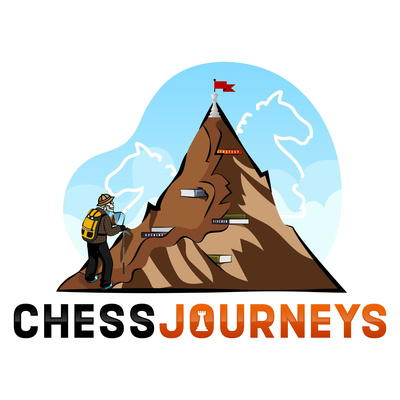This was also published on the MattPlaysChess Substack. Join me there!

In the world of chess improvement, there’s a wealth of knowledge and experience to draw from. One of my favorite sources of inspiration and practical advice has been the “Chess Journeys” podcast. Since its debut in July 2021, this podcast has provided a platform for adult chess players to share their unique journeys, challenges, and triumphs in the game.
With the recent release of its 150th episode, “Chess Journeys” has reached a significant milestone that deserves recognition and applause. This achievement reflects the dedication of the host and the enduring appeal of the podcast to the chess community. The consistent delivery of insightful interviews with chess enthusiasts from all walks of life has made it a valuable resource for anyone looking to improve their game.
As someone deeply invested in enhancing my chess skills, I’ve found the stories and tips shared by the guests incredibly valuable. From the very first episode, I was hooked by the authentic and relatable experiences shared by fellow adult improvers.
All these all this words of wisdom I got from your podcast Jay Garrison, Episode 149, Chess Journeys
Intrigued by the wealth of advice offered, I decided to take things a step further. Using advanced AI tools, I summarized each episode to extract the top tips and strategies mentioned by the guests. After distilling these summaries, I compiled a list of the top 10 chess improvement tips that stood out across all 150 episodes. This blog post is dedicated to sharing those tips with you, along with my personal reflections on implementing them in your own chess journey.
My History with Chess Journeys
I started listening to the “Chess Journeys” podcast in July 2021, right when the first episode was released. At that time, I was eager to consume any chess content I could find, having really gotten into chess just a few months before. I stumbled upon the podcast and started listening, not realizing it was the debut episode until I was already immersed in it. The concept of the podcast immediately caught my attention: interviews with adult chess players discussing their unique experiences and improvement journeys. As an adult chess improver myself, I was eager to learn from others who were on a similar path.
Listening to “Chess Journeys” has had a profound impact on my own chess journey. The stories and tips shared by the guests have provided me with valuable insights and inspiration. Whether it’s learning about new training methods, discovering useful resources, or simply hearing about the challenges and triumphs of fellow chess enthusiasts, each episode has contributed to my growth as a player.
One of the key aspects that make the podcast so appealing is the authenticity of the experiences shared. The guests are relatable and their stories resonate with the common struggles and achievements that many adult improvers face. This sense of connection and community has been a significant motivating factor for me.
Using AI to Generate the Top Tips
To create a comprehensive list of the top chess improvement tips from the “Chess Journeys” podcast, I used AI tools in a straightforward process:
Getting Transcripts: I started by obtaining all the transcripts for the 150 episodes from Spotify. Unlike other platforms, Spotify allowed me to easily copy the transcripts, which made it convenient to gather the text data. This manual process ensured that I had accurate and complete transcripts for each episode.
Summarizing Episodes: With the transcripts in hand, I utilized AI to analyze and summarize each episode. The AI was tasked with identifying the top improvement tips from each episode, initially generating a detailed list for each. To refine this, I further summarized these individual summaries, distilling the content into a master list of the most impactful tips across all episodes.
Training the AI: To enhance the process, I trained the AI model using the collected transcripts, enabling it to answer specific questions about the show, including generating lists of top tips. This training allowed me to cross-verify the results, ensuring consistency and accuracy. Interestingly, both methods—summarizing and direct questioning—yielded very similar results, reinforcing the reliability of the AI’s insights.
Now, let’s dive into these top 10 chess improvement tips and see how they can help you enhance your chess skills.
Top 10 Chess Improvement Tips from “Chess Journeys”

Practice tactics regularly: Utilize tactics trainers, puzzle books, or structured methods (e.g., the Woodpecker method) to improve pattern recognition and calculation skills. Consistent tactical training is crucial for developing the ability to find winning combinations and avoid blunders in games. logseq.order-list-type:: number
Analyze your games thoroughly: Identify mistakes, areas for improvement, and key moments where the evaluation shifted. Do this first on your own, then with a stronger player, coach, or engine. Game analysis is essential for understanding your thought processes, learning from mistakes, and identifying areas for targeted improvement. logseq.order-list-type:: number
Study annotated games: Play through annotated games, focusing on understanding the strategic ideas, plans, and thought processes behind each move. Studying master games helps assimilate chess knowledge, positional understanding, and typical patterns. logseq.order-list-type:: number
Work with a chess coach: A coach can provide personalized guidance, identify weaknesses, recommend study materials, and offer valuable feedback on your games. Regular coaching sessions can accelerate improvement by focusing on areas specific to your needs. logseq.order-list-type:: number
Develop a consistent training routine: Establish a well-structured training plan that covers tactics, game analysis, endgames, openings, and strategic concepts. Consistency and focused practice are key to long-term improvement. logseq.order-list-type:: number
Play longer time control games: Longer games (e.g., 60+ minutes) allow for deeper thinking, calculation, and practicing critical skills under tournament-like conditions. Regularly playing long games is crucial for applying and reinforcing skills acquired through study. logseq.order-list-type:: number
Focus on endgames: Dedicate time to studying endgame positions, practicing against engines, and solving endgame studies. Endgame mastery is a key differentiator and can help save half-points or convert winning positions. logseq.order-list-type:: number
Improve your calculation skills: Work on visualization, candidate moves, and calculating variations through exercises, studies, and analyzing complex positions. Strong calculation skills are essential for accurately evaluating positions and finding the best moves. logseq.order-list-type:: number
Study chess strategy and positional concepts: Read books on chess strategy, pawn structures, and positional play to deepen your understanding of chess. Combining tactical ability with a solid grasp of strategic concepts is necessary for reaching higher levels. logseq.order-list-type:: number
Manage your mindset and psychology: Develop pre-game routines, focusing techniques, and a growth-oriented approach to chess improvement. Maintaining a positive attitude, learning from mistakes, and focusing on the process over results are critical for long-term success and enjoyment of the game. logseq.order-list-type:: number
The Temptation to Switch Study Habits
I want to take a minute to share a word of caution that I struggled with before going on.
As chess enthusiasts, we are often exposed to a plethora of strategies and tips from various sources, including the insightful advice shared on the “Chess Journeys” podcast. While it’s incredibly beneficial to learn from the experiences of others, it’s important to approach this wealth of information with a degree of caution.
One common temptation is to constantly switch study habits based on the latest piece of advice or the newest improvement tip we’ve come across. While this might seem like a proactive way to enhance our skills, it can sometimes lead to a lack of consistency and hinder our overall progress.
Find What Works for You
Every chess player is unique, with different strengths, weaknesses, and learning styles. What works exceptionally well for one person might not be as effective for another. It’s crucial to experiment with different methods and strategies to find what resonates with you personally.
Avoid Frequent Changes
While it’s good to be flexible and open to new ideas, frequent changes in study habits can disrupt your learning process. Consistency is key in chess improvement. Sticking with a particular method for a reasonable period allows you to fully understand its benefits and determine if it genuinely helps you progress.
Balance Learning with Consistency
Strike a balance between incorporating new tips and maintaining a stable study routine. Evaluate new advice critically and consider integrating it gradually into your existing routine rather than making abrupt changes. This approach helps in testing new strategies while preserving the consistency needed for steady improvement.
Personal Reflection and Adaptation
Take time to reflect on your study habits and progress. Regularly review what’s working and what isn’t. Adapt your study plan based on your personal experiences and results rather than solely relying on external advice. This personalized approach ensures that your study habits are aligned with your specific needs and goals.
Incorporating these considerations can help you make the most out of the valuable advice from resources like the “Chess Journeys” podcast while ensuring that your study habits remain effective and tailored to your personal chess journey.
Conclusion
Learning from the experiences of others can be a powerful tool in your chess improvement journey. The “Chess Journeys” podcast, with its 150 episodes, has been a treasure trove of insights, tips, and inspiration from adult chess players around the world. By leveraging AI tools, I was able to distill the wealth of knowledge shared by the podcast’s guests into a top 10 list of improvement tips that can benefit any aspiring chess player.
I hope the top 10 tips from the “Chess Journeys” podcast provide you with valuable guidance and motivation on your own chess journey. Stay tuned for a follow-up post where I will share how I plan to structure my chess study based on these tips. Your own experiences and insights are also invaluable, so I invite you to share them in the comments below.
Together, let’s continue to learn, grow, and improve our chess skills, drawing inspiration from the collective wisdom of the chess community.
And now that I have this process, I might also try it for other podcasts, like the “Adult Improver” series from Perpetual Chess!